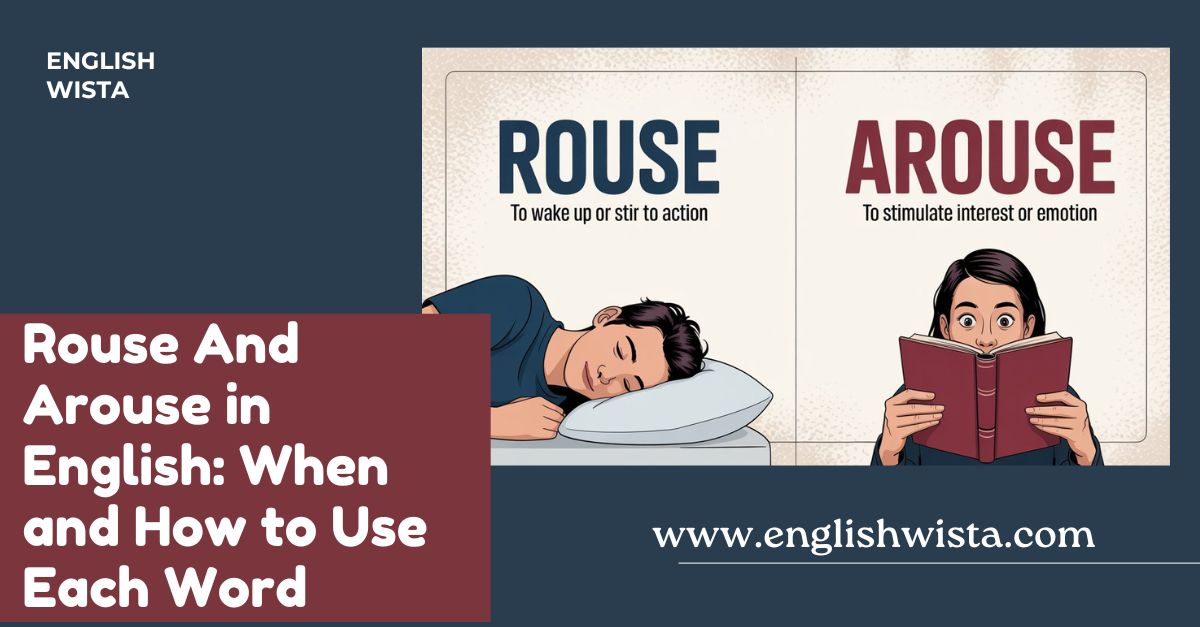Have you ever been in a situation where you weren’t sure whether to say rouse or arouse? You’re not alone! These two words look similar, sound almost the same, and even share some overlapping meanings. Because of this, people often confuse them. But don’t worry by the time you finish this article, you’ll know exactly when to use each word with confidence.
In this guide, we’ll break down the meanings of rouse and arouse, explore how they’re different, and see them in action with plenty of examples. We’ll also look at some fun facts, their origins, and simple memory tricks to help you remember the difference. Let’s dive in!
What Does Rouse Mean?
At its core, rouse means to wake someone up or to stir them into action. Think of it as the word you’d use when you’re trying to get someone out of bed, or when you’re motivating a group of people to get moving.
Definition of Rouse:
- To wake up from sleep.
- To stir up, excite, or bring into activity.
Examples of Rouse in Sentences:
- “She tried to rouse her brother, but he kept sleeping.”
- “The coach gave a fiery speech to rouse the players before the big game.”
- “Loud noises outside the window can easily rouse a light sleeper.”
Notice how in all these cases, rouse is about moving someone from a passive state (like sleeping or doing nothing) into an active one.
What Does Arouse Mean?
Now let’s look at arouse. This word is a bit broader. It’s not usually about literally waking someone up from sleep. Instead, it’s about stirring emotions, feelings, or responses in someone.
Definition of Arouse:
- To awaken a feeling or emotion.
- To stimulate or trigger a reaction.
Examples of Arouse in Sentences:
- “The movie was designed to arouse fear in the audience.”
- “The news report aroused anger among the citizens.”
- “Her kind words aroused hope in his heart.”
Here, arouse doesn’t mean “wake up” in the physical sense. It’s about awakening something inside whether that’s fear, excitement, anger, curiosity, or even love.
Quick Comparison Between Rouse and Arouse
To make it super simple, here’s the core difference:
- Rouse = wake up or stir into action (physical or motivational).
- Arouse = awaken feelings, emotions, or responses (emotional or mental).
Think of it this way:
- You rouse a friend from sleep.
- You arouse curiosity, anger, or suspicion.
Why Do People Confuse Them?
Great question! There are a few reasons:
- They sound alike. Both words rhyme, and when spoken quickly, they can almost blend together.
- They share roots. Both come from the Old French word reuser (to shake or stir up). This makes their meanings overlap.
- They both deal with “stirring up.” Whether it’s stirring up a sleeper (rouse) or stirring up emotions (arouse), the base idea feels very similar.
So if you’ve been mixing them up, don’t feel bad it’s a very common mistake!
When Should You Use Rouse?
Let’s take a closer look at situations where rouse is the right choice:
- Waking someone up physically:
- “She gently shook him to rouse him from his nap.”
- Encouraging or motivating action:
- “The speaker managed to rouse the audience into applause.”
- Starting movement or energy:
- “The storm roused the entire town.”
Tip: If it’s about waking someone or getting people moving, rouse is your go-to word.
When Should You Use Arouse?
Now let’s focus on arouse. Use this word when you’re talking about emotions, feelings, or inner responses:
- Emotional reactions:
- “The speech aroused deep feelings of pride.”
- Mental stimulation:
- “The book aroused her curiosity.”
- Negative emotions too:
- “The unfair decision aroused anger in the workers.”
Tip: If it’s about emotions, thoughts, or feelings, arouse is the safer choice.
Memory Tricks to Remember the Difference
Here are some simple ways to keep the two words straight in your mind:
- Rouse = Rise. Both start with “R.” Think of someone rising from bed when you “rouse” them.
- Arouse = Awake emotions. Both words start with “A.” If it’s about awakening feelings, it’s arouse.
More Examples to Reinforce the Difference
Let’s put them side by side for clarity:
- “He tried to rouse his roommate, who was still asleep.”
- “The teacher’s words aroused interest in science.”
- “The alarm clock roused me at 6 a.m.”
- “The movie trailer aroused excitement.”
- “Protesters were roused to action by the new law.”
- “The injustice aroused anger among the people.”
Notice the pattern? Rouse = action or waking up. Arouse = feelings or emotions.
Fun Facts About Rouse and Arouse
- Historical roots: Both words trace back to Old French, where reuser meant “to shake.” Over time, English borrowed and adapted them into slightly different roles.
- Poetic use: In old literature, rouse was sometimes used for emotions too, but today, arouse is more common in that sense.
- Common mix-ups: Even native English speakers mix these up in writing, so if you’re learning English, you’re actually in good company.
Frequently Asked Questions
1. Can I use “rouse” instead of “arouse”?
Not usually. While older texts sometimes used them interchangeably, modern English prefers to keep them separate. If you’re talking about waking someone physically rouse. If it’s about emotions arouse.
2. Is “arouse” always formal?
Not always, but it does sound a bit more formal than rouse. For everyday situations like waking a friend, rouse feels more natural.
3. Can “arouse” mean sexual excitement?
Yes, and that’s one reason people sometimes hesitate to use it. But remember, it doesn’t only mean that. It can also mean to awaken curiosity, anger, or any other feeling.
4. Is there a noun form?
Yes! From rouse, you get “rousal” (though it’s rare). From arouse, you get “arousal,” which is much more common.
Extra Tip: Watch the Context
The best way to know which word to use is by looking at the context. Ask yourself:
- Am I talking about waking someone physically or motivating them? → Use rouse.
- Am I talking about emotions, thoughts, or reactions? → Use arouse.
Conclusion
So there you have it the difference between rouse and arouse made simple!
- Rouse is about waking someone up or stirring them into action.
- Arouse is about awakening emotions, thoughts, or reactions.
Both words come from the same root idea of “stirring up,” but today they play different roles in English. By keeping their meanings straight and practicing with examples, you’ll never confuse them again.
Next time you hear someone say, “The speech roused the crowd” or “The movie aroused fear,” you’ll know exactly why the speaker chose that word.
And remember: if you can rouse a friend from sleep and arouse curiosity about language, you’re already a master of both words!



